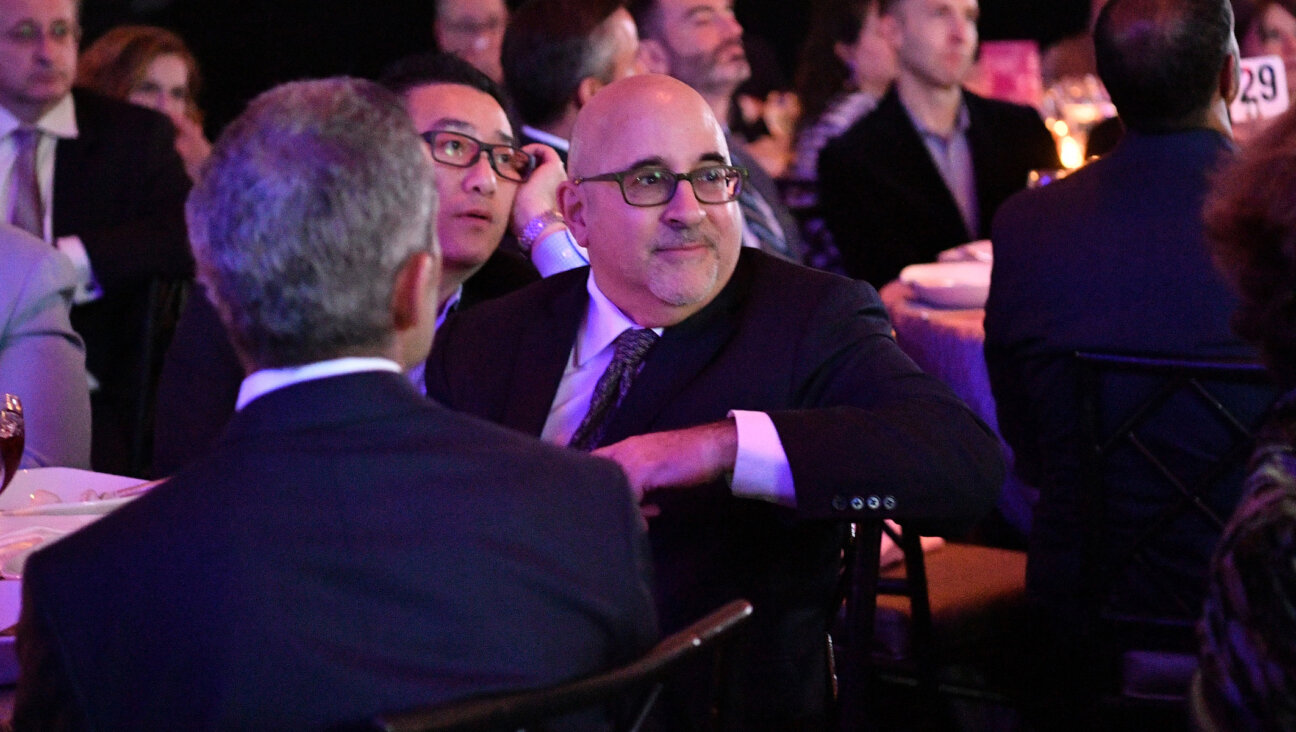Q&A: Danyelle Freeman, ‘Restaurant Girl’, Dishes on her Favorite Kosher Restaurants

Image by Courtesy Danyelle Freeman
In her new book, “Try This: Traveling the Globe Without Leaving the Table,” Danyelle Freeman offers a gastronomical guide to 14 different ethnic cuisines — from British to Vietnamese. The former Daily News restaurant critic, founder of the popular Restaurant Girl blog and recent “Top Chef Masters” guest judge details the ingredients and preparations common in each cuisine. She also recommends restaurants in New York and LA for the best versions of each one (see Freeman’s NYC kosher restaurant recs below).
In “Try This,” Freeman also provides the reader with invaluable information on each culture’s table manners, to avoid making cultural gaffes while dining out. (Did you know that at a Japanese restaurant you should never leave your chopsticks upright in a bowl of rice? The upright chopsticks resemble incense sticks that the Japanese light to commemorate the dead.)
Freeman is a true foodie who experiences life one meal at a time. In her book she describes going on a date at a Cuban restaurant and writes, “Though I can’t remember my date’s name for the life of me, I do remember what we had for dinner.”
We spoke to Freeman about her book, her Jewish upbringing in Short Hills, NJ, and how she views Jewish food as “underrated.”
Lucy Cohen Blatter: What made you want to write this book?
Danyelle Freeman: I get such joy and excitement out of every meal, and I see each meal as an opportunity and an adventure. When you go out to eat, you have the opportunity to go out of your comfort zone and try something new.
I really wanted to create a guide to dining out — a guide people could grab before dinner that would encourage them to go out and try new foods. We all fall into food ruts. We tend to go to a Mexican place and order guacamole and a burrito. That’s fine, but you might find a new favorite comfort food if you look at the other side of the menu.
What are some new comfort foods you’ve found?
When I’m sick, I’ll have a Korean ginger ginseng soup or a Mexican posole soup with hominy [dried maize kernels] instead of just chicken soup.
Did your job as a restaurant critic make you more interested in ethnic cuisines?
Yes. I used to be a picky eater. I was even a vegetarian for a while. I always say I’m making up for lost time now.
As a critic I was always trying new cuisines and new neighborhoods, and I fell in love with different foods. When I had the opportunity to find a new Korean place or Thai place, where the chef had just arrived in America, it was great. I could feel like I was in Korea or Thailand for the evening. They were these amazing secret discoveries that I wanted to share with people.
One thing that I found refreshing about the book was the fact that it’s not written just for devout foodies like you.
There’s so much food writing out there that’s sort of “inside baseball.” You have to be a food writer or chef or foodie or you feel left out. I wrote this for anyone who loves going out to eat — for food lovers, but not necessarily foodies. The truth is that once you understand what’s involved in a particular cuisine — which usually consists of a handful of herbs and ingredients — it’s a lot less intimidating and scary.
In the book you talk about going out to eat as a kid. Were you brought up to be a foodie?
We went out to eat a lot, but we didn’t go to places that needed reservations. We weren’t four-star foodies.
Did you grow up eating Jewish food?
Yeah. We had noodle kugel, kasha varnishkas, charoset, potato pancakes and matzoh ball soup. We were obsessed with halvah.
Do you still enjoy Jewish food now?
Are you kidding? I love it. I think Jewish food is underrated— I love chopped liver, deli, knishes, derma and babka. I want to write a book on American cuisine next and I’d love to include Jewish food.
Any favorite delis in NY or LA?
I like Langer’s in LA so much. I think in New York, Katz’s is probably my favorite for pastrami. I also love smoked fish, so Russ and Daughters and Sable’s and Barney Greengrass in New York are all great.
What do you think of the recent deli renaissance, with new non-traditional delis like Brooklyn’s Mile End and San Francisco’s Wise Sons?
Over the past few years, the dining world has been paying homage to Jewish deli. It’s like we’ve rediscovered these genres of food — everything from pastrami to matzo ball soup. Young, ambitious chefs are injecting their own style and creativity to these classics.
I’m dying to try Wise Sons! I love the idea of a pop-up Jewish deli open only on Saturdays. It’s amazing that these two guys perfected their smoked pastrami recipe in a backyard and I admire the thoughtfulness they apply to everything from matzo ball soup to babka.
Deli food is some of the best comfort food there is. The Gorbals in downtown L.A. is another great example. After being a contestant on “Top Chef,” Ilan Hall could’ve opened any kind of restaurant, but he debuted with a Scottish-Jewish restaurant to reflect his heritage. He’s turning out inspired cooking influenced by Jews, Scottish as well as countries from all over the world.
Then, there’s Mile End — a Montreal-style Jewish delicatessen famous for its house-cured brisket. I love how you can find smoked salami and kreplach on the same menu as Canadian poutine [cheese-cured smothered fries].
In your chapter on Middle Eastern cuisine you write: ‘“The only thing they can agree on in the Middle East is food. I think everyone should sit down and settle their disputes over a little baba ghanoush and baklava. And falafel…. They can swap recipes for firearms.”
Yep. I say, let me sit in on the next meeting between the two sides. I could help them bond over their love of hummus.
What are some of your favorite Israeli foods?
I love sabich, which is a pita sandwich filled with fried eggplants and hard boiled eggs. They make a great sabich at Taim in the West Village. You don’t miss the meat at all. In Brooklyn, Miriam has wonderful Israeli food. It’s sophisticated and she puts it on a pedestal.
Are there any major faux pas to avoid when eating with Israelis?
[Not] many. Sharing is key, which is true of most Middle Eastern cooking. And, of course, not mixing dairy and meat.
A lot of the foods that we consider Israeli food are eaten in many Middle Eastern countries. Are there any dishes exclusive to Israel?
There’s Israeli salad — the combination of cucumber and tomato, olive oil and lemon juice; Israeli couscous, and pomegranate sauce. In Israeli cooking you see a lot of fruit-based sauces instead of cream sauces, because of the meat and milk issue.
Is Israeli food one of your favorites?
I really like it. But I don’t like to pick favorites.
Restaurant Girl’s NYC Kosher Restaurant Recommendations:
Mill Basin Deli: Freeman described this Brooklyn deli as “excellent and worth a field trip from Manhattan.”
[Le Marais][13]: “For outstanding steaks and kosher French fare, which is a rare find in these parts. There’s even a butcher shop next door to boot, so you can pick up some aged meat to-go. “
Pongal Freeman likes this Curry Hill spot “for dosas and traditional Indian cooking.”
[The Prime Grill][15]: Though “pricey,” Freeman says this midtown restaurant has a “standout rib eye as well as impressive.”
Tevere: This Upper East Side meat restaurant “looks more like an old school Italian restaurant than kosher establishment. But it’s 100% kosher and it’s great for Italian classic cravings, like gnocchi, pasta fagioli and veal scaloppini.”
A message from our Publisher & CEO Rachel Fishman Feddersen

I hope you appreciated this article. Before you go, I’d like to ask you to please support the Forward’s award-winning, nonprofit journalism so that we can be prepared for whatever news 2025 brings.
At a time when other newsrooms are closing or cutting back, the Forward has removed its paywall and invested additional resources to report on the ground from Israel and around the U.S. on the impact of the war, rising antisemitism and polarized discourse.
Readers like you make it all possible. Support our work by becoming a Forward Member and connect with our journalism and your community.
— Rachel Fishman Feddersen, Publisher and CEO























